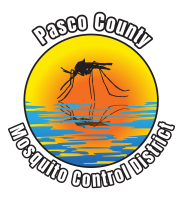FAQ's
- Eliminate Standing Water: Regularly empty containers (buckets, bird baths, tires) where mosquitoes lay eggs.
- Use Repellent: Apply US EPA-registered insect repellents to exposed skin.
- Wear Protective Clothing: Cover up with long sleeves and pants, especially during dusk and dawn when most mosquitoes are active.
- Secure Your Home: Ensure windows and doors have intact screens to keep mosquitoes out.
This FAQ page is designed to address common questions, but if you need further assistance, please contact our office—we’re here to help.727.376.4568 - Mon-Fri 7:00am-3:30pm
